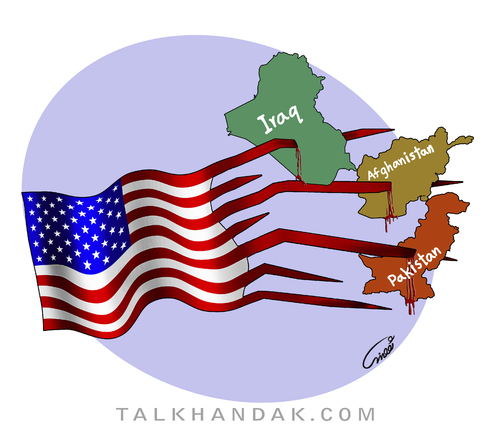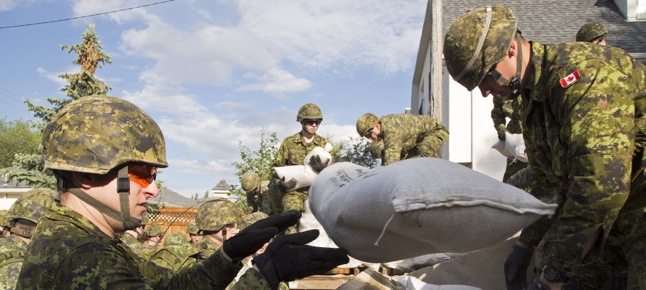“What Happens to Canada if US is in Decline?” Jack Granatstein posed this question in a December 2013 column for the Canadian Defence & Foreign Affairs Institute. Both media personalities and prominent foreign policy commentators have devoted significant attention to what they perceive as US decline in world affairs over the past several years. In recent months, “declinism” gained support from polls revealing that the American public is increasingly isolationist and pessimistic about US global influence.
Of course, it is not at all certain that the US is in decline, at least in the popular conception of that term. “Declinism” has long been a popular point of view, and as early as 1988 Samuel Huntington already spoke of 5 separate phases of perceived decline in US history. In 1987, renowned Yale historian Paul Kennedy in his book The Rise and Fall of the Great Powers predicted that the US was suffering from “imperial overstretch,” yet four years later the Soviet Union had collapsed and the US enjoyed unprecedented global dominance. Even today, as Josef Joffe explains, the rhetoric of decline seriously underestimates America’s continued strengths in higher education, demography, and military power relative to its emerging power competitors.
In fact, the US is declining not in absolute terms, but in relative terms. The US economy is growing, but China, India, and other states in the Asia-Pacific region are growing at a faster rate. Granatstein seems to assume this will lead the US to return to isolationism, but this does not logically follow. Instead, the Obama administration has decided to “pivot” to the Pacific, tying America’s future to its role as a Pacific power. The US’ leading role in negotiations for a Trans-Pacific Partnership trade agreement is a testament to its continued determination to play a decisive role in global affairs.
Still, even if one accepts the premise that the US is in decline and will be returning to a form of isolationism and reducing its global role, what does this mean for Canadian security? Granatstein chides Canadian nationalists for glorying in US decline, saying this is foolish because the US is the main provider of Canadian security. Should the US resort to isolationism, he warns, Canada would be stuck with paying the cost of its own defense.
Granatstein is right that since US President Franklin D. Roosevelt’s 1938 defense pledge to Canada given at Queen’s University, the US has guaranteed Canada’s security. However, even in the event of a US turn to isolationism, it is highly unlikely that the US would abandon Canada to its own devices and focus on a “fortress America.” In fact, since the Monroe Doctrine US foreign policy has aimed to prevent foreign penetration of the Americas because this could pose a threat to US security.
As a result, a cornerstone of Canadian defense policy is to keep Canadian sovereign territory, airspace, or sea zones from being used as a platform to attack the US. Obviously, this is a key US interest too, which is why the US has guaranteed Canada’s security. Out of basic self-interest, even an isolationist US would pursue not “fortress America” but “fortress North America.” As a result, an isolationist US might even devote more energy and resources, not less, to defending Canada.
One question Granatstein does not address is the continued relevance of NATO in an age of US decline. While Granatstein suggests that US decline would make the US turn inward, many influential American scholars and policy elites argue that the US should instead pursue closer trans-Atlantic relations with Europe by strengthening NATO and forging a customs union with the EU. Of course, this approach faces serious problems, including US skepticism about the value of NATO that stems from European states’ low level of defense spending and reluctance to commit to the Afghanistan War. Still, it is a real possibility, as the ongoing US-EU free trade talks reveal. Moreover, it is in Canada’s interests to promote NATO’s continued relevance as a forum for Western defense cooperation, as the Alliance is both a valuable tool of power projection and useful counterweight in Canada’s defense policy to pure dependence on the US.
In conclusion, US decline is greatly overstated, and should not be conflated with a return to isolationism. Moreover, Canada should not fear that it will be cast to its own devices in the security arena in the unlikely event that the US should choose a path of isolationism. In fact, a US focused narrowly on national defense would likely take a greater interest in Canada. In addition, it is in Canada’s interest to foster the trans-Atlantic partnership and revitalize NATO as a defense forum. Not only does this strengthen the Alliance, but it allows Canada to work in a multilateral security partnership rather than remain totally dependent on the US.





